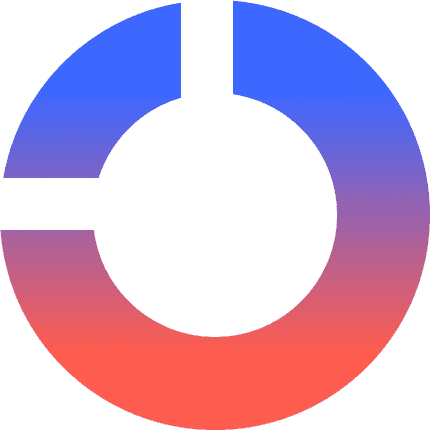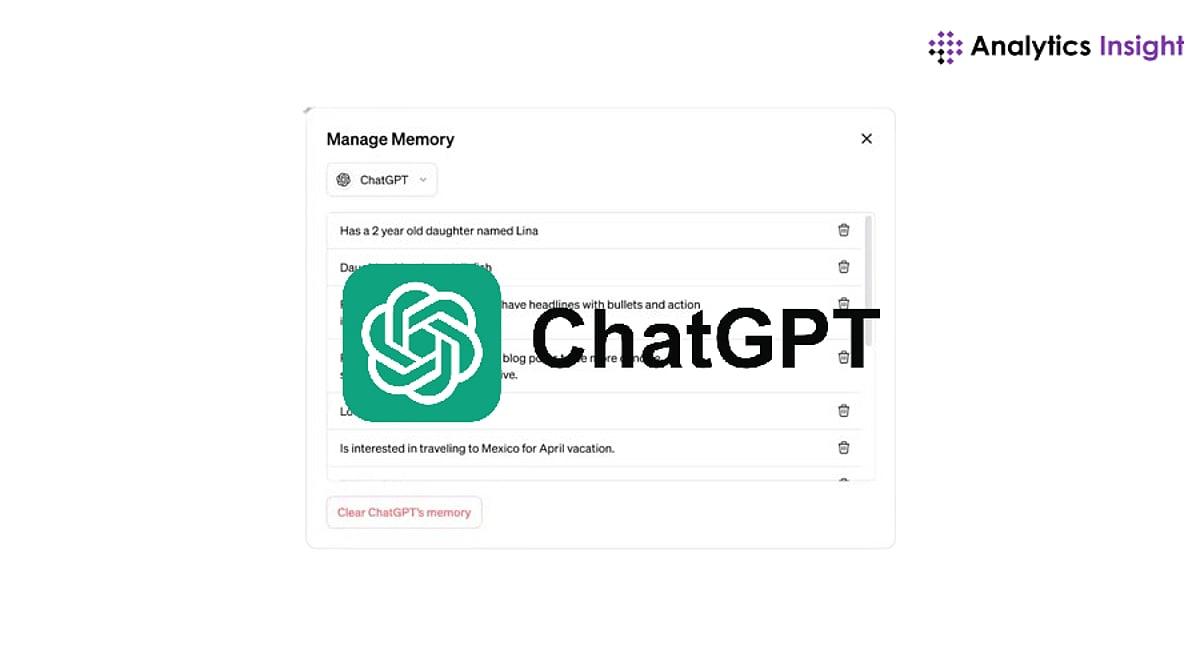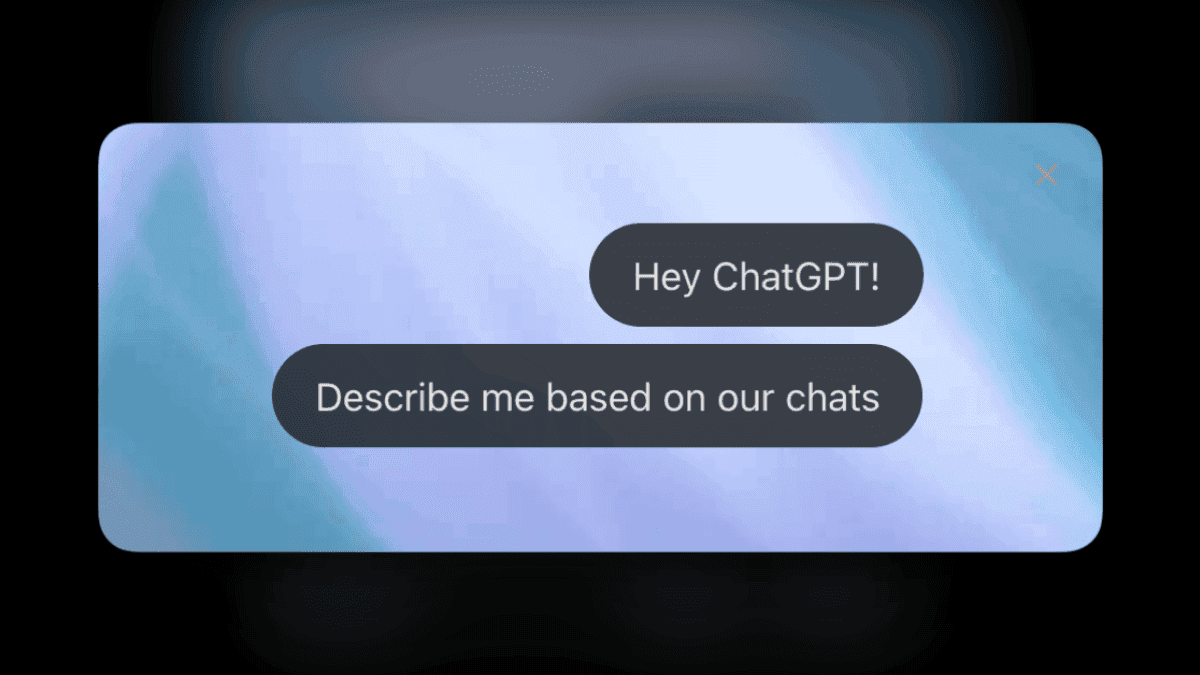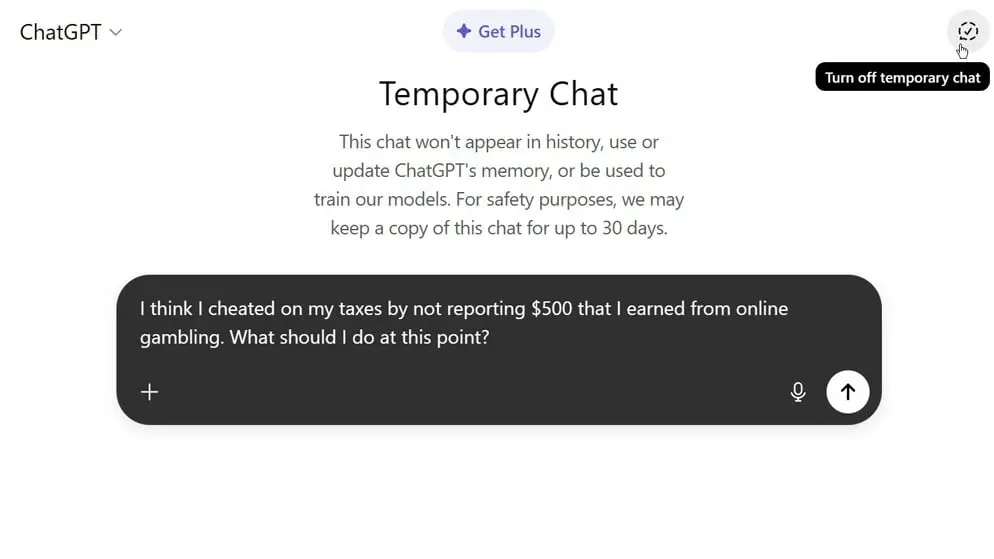ChatGPT Extends Memory Feature to Free Users: Enhancing Personalization and Continuity
9 Sources
9 Sources
[1]
ChatGPT Will Now Reference Past Conversations With Free-Tier Chatters
Expertise Community solar, state solar policy, solar cost and accessibility, renewable energy, electric vehicles, video games, home internet for gaming. ChatGPT's ability to learn and recall facts and information you feed it during your conversations is no longer limited to premium subscribers. An X post by OpenAI on Tuesday revealed that the AI chatbot will now reference recent conversations with people that have a free-tier membership as well. OpenAI's chatbot already remembers tens of thousands of tokens (or individual queries) at any point in time, but the latest memory updates have allowed ChatGPT to pull more information from prior messages you've sent it -- ranging from your name to previous scenarios you asked for advice about. (Disclosure: Ziff Davis, CNET's parent company, in April filed a lawsuit against OpenAI, alleging it infringed Ziff Davis copyrights in training and operating its AI systems.) This level of adaptability lets people "train" ChatGPT to suit their needs (whether that be troubleshooting tech issues or creating a romantic partner) and influences how the chatbot will tailor its replies for as far back as its database of your queries extends. The memory update for free-tier chatters is a "lightweight" version of what's available to Plus- and Pro-tier ChatGPT subscribers, but it's not immediately clear how many tokens the chatbot will save and mull through for the free subscription tier. What is clear is that the free version of OpenAI's chatbot will now be able to be trained to deliver more personalized responses. ChatGPT Free is one of CNET's best AI chatbots, and the new memory upgrade helps it stand out among the competition. If you want to disable ChatGPT's ability to save memories, you can do so from the personalization tab of the settings menu. This won't delete memories that the AI has already saved -- you need to delete the original query and tell the chatbot to forget the memory, instead. A representative for OpenAI did not immediately respond to a request for comment.
[2]
ChatGPT free users finally have access to this really helpful feature
Now, ChatGPT can remember details about you for added assistance. Here's how to access the feature - if you really want it Imagine every time you had to talk to your friends or family, you had to re-explain your entire backstory. While this reality is a great plot for a rom-com like 50 First Dates, it wouldn't be efficient for everyday communication. That is why ChatGPT has a Memory feature -- and now you can access it for free. On Tuesday, OpenAI announced it was rolling out a lightweight version of memory improvements to free users. The update expands ChatGPT's ability to remember some information about you, now allowing it to reference all your recent conversations. This can be used as content for more personalized responses. (Disclosure: Ziff Davis, ZDNET's parent company, filed an April 2025 lawsuit against OpenAI, alleging it infringed Ziff Davis copyrights in training and operating its AI systems.) OpenAI originally launched the Memory feature for ChatGPT in April. At the time, it was only available to paying subscribers, including Plus, Pro, Team, Enterprise, and Edu users -- making this update a big win for free users. Although the feature may seem simple, as OpenAI CEO Sam Altman said at launch, "this is a surprisingly great feature." It saves time on explaining what you have already told the assistant and ensures you get responses that are more tailored to you. Also: How to use ChatGPT freely without giving up your privacy - with one simple trick For example, if you explain to it once the diet you are on, the pets you have, the projects you are working on, your trips, and your hobbies, in the future, you don't have to share those details again. You can just ask questions like: "What fruit can I give my dog as a treat? "What should I make for dinner?" "Can we roleplay the interview for that job I am applying to again?" While there are some clear advantages to using the updated Memory feature, some might be hesitant about OpenAI storing their personal and prior conversation data. To address those concerns, OpenAI offers two solutions. If you would prefer to use ChatGPT without the Memory feature, you still have the option. You can turn it off entirely within Settings by clicking on Personalization and then toggling the "Reference saved memories" feature off. For a more temporary solution in instances that you don't want it to remember a specific, perhaps more personal or sensitive prompt, you can also turn on Temporary Chat. In the same way you click on Incognito mode in Google Chrome or Private Window in Safari when you want privacy, you can turn on Temporary Chat in ChatGPT. The button is located at the top-right corner of the home page, and once you click it, the new chat interface immediately appears. I often default to this feature for the added peace of mind. You can turn on the feature in the same place where you can turn it off, simply by sliding the toggle. If you are a free user and still don't see the option, it is likely because it hasn't rolled out to you yet. At the time of writing this article, I was granted the feature from my free account and was alerted by the pop-up seen above.
[3]
ChatGPT rolls out Memory upgrade for free users
ChatGPT's memory feature is now better and capable of referencing past conversations for free accounts. In an update to its support document, OpenAI quietly confirmed that it has rolled out a new version of Memory that better remembers and references your past conversations. This feature was previously available for paid subscribers, but it's rolling out to everyone today. "On June 03, 2025, we're starting to roll out memory improvements to logged in Free users," OpenAI wrote in a support document. With the new Memory feature, ChatGPT is capable of saving conversations for a longer period. For example, if you've instructed ChatGPT to remember not to use em dashes and it saved it in memory, it's likely the AI will reference that conversation in all its new or future conversations. "In addition to the saved memories that were there before, ChatGPT now references your recent conversations to deliver responses that feel more relevant and tailored to you," the company noted. However, BleepingComputer noticed that ChatGPT free version's Memory feature will have some limitations despite the upgrade. Free users are getting access to a lightweight version of the memory upgrade, which provides short-term continuity across conversations only. On the other hand, if you pay $20 for ChatGPT Plus or $200 for ChatGPT Pro, you'll get access to a more powerful Memory that references older messages. While these improvements are nice, some of you may not like ChatGPT referencing your past conversations. If you don't like ChatGPT remembering everything from your conversations, open ChatGPT Settings and turn off Memory or remove specific memories that you think should not be stored. You can also use ChatGPT "Temporary Chat" feature, which is similar to using Chrome in incoginto mode.
[4]
Free ChatGPT users can finally stop re-explaining themselves in every session
You can decide what ChatGPT remembers or disable it if you choose OpenAI has a reliable strategy of releasing new ChatGPT features for paying subscribers first before rolling them out to everyone. If you didn't remember that, don't worry because ChatGPT can do so for you now, even if you don't subscribe to ChatGPT Plus or another tier. The memory improvements for ChatGPT aren't exactly the same as those offered with a subscription, but they are potentially very significant for users interested in personalizing their AI chatbot experience. Like paid tier users, free ChatGPT users can now access the "memory" feature and turn on ChatGPT's recall. That means the AI will be able to reference recent conversations to make its answers feel a little more tailored to you. Suppose you told the AI a while ago that you wanted help learning Italian or that you wanted dairy-free recipe ideas. Now, if you ask for dinner suggestions, it might recommend something like "risotto alla Milanese with a plant-based twist" and suggest providing you with the recipe in Italian to help you practice. It's not precisely what paid users get from ChatGPT's memory. The "lightweight" version of memory, as OpenAI calls it, is only designed for the short term. ChatGPT can remember a few recent details, but it won't have a long-term, detailed, and persistent memory. That's still reserved for ChatGPT Plus and Pro users. It's a matter of days versus months of remembered conversations. You don't have to let ChatGPT remember things, of course. You can toggle off saved memories and chat history at any time. There's also the "Temporary Chat" option, essentially an incognito or guest mode that doesn't save anything to ChatGPT's memory. There is also a slight geographical variation in how the new ChatGPT memory functions. For most users, if ChatGPT memory is enabled, it will update automatically. If you're a free ChatGPT user in pretty much all of Europe, however, you won't get the memory feature by default. You'll need to opt into it in the Memory section of your ChatGPT's memory feature is part of OpenAI's effort to make interacting with AI chatbots on a regular basis feel more natural and personalized. The company's vision is of an ongoing relationship between you and your AI assistant, not just an intermittent and brief chat for a single request. And memory is arguably a fundamental step toward making AI more useful in everyday life. After all, remembering previous conversations is essential to any ongoing relationship between people. Remembering who someone is and details about them i how you seperate a strangerf from an acquaintance, friend, or even enemy. . Though the free-tier memory isn't as robust as the subscriber's version, it's still a good way for ChatGPT to demonstrate its benefits to ChatGPT users. It's easy to imagine it helping convince people to pay $20 a month for the more comprehensive version. And if they don't remember how to sign up, ChatGPT will be happy to remind them of the necessary steps.
[5]
GhatGPT Can Now Remember Conversations for Free Users Too
Khamosh Pathak is freelancer tech journalist with over 13 years of experience writing online. ChatGPT introduced its Memory feature more than a year ago now. This feature lets users save particular details about their life or work in the ChatGPT memory bank, so they don't need to repeat them with each new prompt. But using the Memory feature as it launched frequently required manually checking which information was saved and managing it yourself, which meant it was pretty easy to let it fall behind. OpenAI's solution was to let ChatGPT remember way more about you. The Memory feature now builds a long-term memory bank based on all your saved ChatGPT conversations, rather than just key details. You can still save those key details, but you don't have to rely only on them anymore. Until now, conversation memory was limited to paid users, meaning those with a ChatGPT Plus plan and higher. Now, though, OpenAI is rolling out a limited version of this feature for all free and logged-in users. If you use ChatGPT multiple times a day, this might help reduce some back and forth in your conversations with it. Now, in addition to being able to remember key details about you, which was already available to free users, ChatGPT can reference your chat history, even if you don't pay for it. However, chat history for free users will be limited to recent conversations, whereas paid users can have the AI remember all of their conversation history. When this feature is enabled, ChatGPT will use your past conversations to automatically recall useful information about you that you've shared with it before. It will use this to learn about your interests, hobbies, or topics you frequently ask about, in order to make chats more personalized and relevant. How far back the feature's memory can pull from for free users isn't exactly clear. OpenAI says the free version of this feature is "lightweight" and focuses on "short term continuity," so don't expect it to pull back from conversations that are a few years, or possibly even months, old. There is an unscientific way to test what ChatGPT knows about you, though. In addition to checking your saved memories (I'll get to that in a second), you could ask the bot to describe you based on your chat history with it. ChatGPT will list what it knows about you based on the previous conversations available in its memory. I can see this feature being useful to people who use ChatGPT all the time. If you use ChatGPT to plan out workouts and meals based on specific information you've already given it about you, for instance, I can see how accessing information shared in a chat from a week ago can be helpful. Just be careful not to trust its advice too much. On the flipside, there will be times when you either won't want ChatGPT to remember something, or you'd rather it not check your conversation history when finding an answer. To temporarily avoid the memory feature upgrade, you can try using ChatGPT's Temporary Chat feature, which is like ChatGPT's Incognito mode. The things you say here won't be saved by ChatGPT history or by this new Memory feature. When you start a new chat, use the dotted Chat icon in the top-right corner to turn it into a Temporary chat. A more permanent option is to turn off the feature altogether. This is good if you'd rather ChatGPT not remember any of your conversations. To do this, click your Profile icon in ChatGPT and choose Settings. Go to Personalization, and find the Memory section. Now, disable the Reference chat history option. This will prevent the AI from remembering what you've said to it before. You can also disable Reference saved memories here, which both turns off chat history and keeps ChatGPT from remembering key details about you. Alternatively, click Manage memories to see a specific list of key details that ChatGPT knows about you, and delete them if you wish.
[6]
This ChatGPT feature just quietly went free
OpenAI is enhancing ChatGPT's ability to remember past interactions, announcing that its improved "Memory" feature is now becoming available to free users, after an initial period exclusive to paid subscribers. This development promises a more personalized and continuous experience with the popular AI. The core of the upgrade, as detailed in an OpenAI support document, allows ChatGPT to retain information from conversations over extended periods. For example, if a user specifies a stylistic preference, such as avoiding em dashes, the AI is now more likely to adhere to this instruction in future chats. "In addition to the saved memories that were there before, ChatGPT now references your recent conversations to deliver responses that feel more relevant and tailored to you," OpenAI explained, highlighting the move towards more intuitive interactions. OpenAI's ChatGPT could be your new login system However, there are distinctions in how the Memory feature operates across different user tiers. While free users will benefit from a version providing short-term continuity across conversations, subscribers to premium plans like ChatGPT Plus ($20/month) or the rumored ChatGPT Pro ($200/month) will gain access to a more robust Memory function capable of referencing a deeper history of older messages. For users concerned about privacy or who prefer ephemeral interactions, OpenAI offers several controls. The Memory feature can be disabled entirely, or specific memories can be selectively removed through ChatGPT's settings. Additionally, a "Temporary Chat" option provides an experience akin to incognito Browse, where conversations are not retained.
[7]
ChatGPT Will Now Reference Past Chats to Even Those on the Free Tier
The coding agent is now also available to the ChatGPT Plus subscribers OpenAI is now rolling out ChatGPT's memory improvements to those on the free tier of the platform. Announced on Tuesday, the San Francisco-based artificial intelligence (AI) firm announced that now all users of the chatbot will get personalised responses based on their previous conversations with ChatGPT. Notably, the free users are getting a lightweight version of the feature. Additionally, the company is also providing Codex, its coding-focused AI agent, full access to the Internet that can be activated during the setup phase. In a post on X (formerly known as Twitter), the official handle of OpenAI announced the rollout of the new feature. The memory boost was first introduced in April to the ChatGPT Plus, Team, and Pro subscribers. However, now, it is also being expanded to those users who are on the free tier of the platform. Before this memory improvement, ChatGPT could only save and remember specific information about users, which could be changed or deleted manually by visiting the Memory section in Settings. However, the current upgrade will also allow the AI chatbot to gain information and context from past conversations with the user. This means whenever users start a new session, users will not have to repeat old information in a detailed prompt. Instead, they can start a normal conversation, and ChatGPT will already know the context. Users can also remind the chatbot about a particular conversation using a prompt. For instance, they can type, "Based on our conversation about the quarterly performance report, tell me what the goals should be for the next quarter," and it will understand the context. Notably, OpenAI highlighted that the free users will get a lightweight version of the feature, instead of what the paid subscribers are getting. However, the company did not mention what the changes would be. Separately, the AI firm is also upgrading its coding agent Codex. In a post on X, OpenAI CEO Sam Altman announced that Codex will now have full access to the Internet, which can be activated during the setup phase. This setting will remain turned off by default. In its support page, OpenAI has highlighted that enabling Internet connectivity for Codex could expose users and organisations to security risks. The company mentions risks such as prompt injection, exfiltration of code, and inclusion of malware. These risks occur as the AI agent navigates across the web and ends up retrieving or processing untrusted or harmful content. Altman also mentioned that Codex is now also being made available to the ChatGPT Plus tier. Earlier, the AI agent was only available to Pro subscribers.
[8]
ChatGPT Adds Memory for Free Users: What It Means for You?
Want the inside scoop on how to use ChatGPT's latest update? Read the article now! OpenAI revealed that ChatGPT's short-term memory is now available to users on the free tier. This means the AI can recall details from past interactions across different chats, not just within a single session. Users may notice ChatGPT remembering preferences, writing styles, or topics previously discussed. This move marks a significant step toward making the chatbot more consistent, helpful, and personalised, even for users on the free plan.
[9]
OpenAI rolls out memory improvements for ChatGPT free users By Investing.com
Investing.com -- OpenAI, the artificial intelligence research lab, announced on June 03, 2025, that it has begun to implement memory improvements for its Free users of ChatGPT. The update allows ChatGPT to refer to recent conversations, providing responses that are more relevant and customized to the user's context. The memory improvements for Free users are designed to provide short-term continuity across conversations. This lightweight version of the memory enhancement is different from the ones offered to Plus and Pro users, which are designed for long-term understanding of the user. For Free users located in the European Economic Area (EEA), which includes the EU, UK, Switzerland, Norway, Iceland, and Liechtenstein, they will be prompted to enable this new feature. They can also manually activate it by navigating to Settings > Personalization > Memory > Reference chat history. In contrast, Free users outside the listed European regions will receive the memory upgrade automatically, provided they have the memory function enabled. OpenAI has emphasized that users have full control over ChatGPT's memory. They can opt to disable the referencing of "saved memories" or "chat history" at any time in the settings. Additionally, they have the option to use Temporary Chat for conversations that do not require or update memory.
Share
Share
Copy Link
OpenAI rolls out a lightweight version of ChatGPT's memory feature to free users, allowing the AI to reference recent conversations for more personalized interactions.
ChatGPT's Memory Upgrade for Free Users
OpenAI has announced a significant update to ChatGPT, extending its memory feature to free users. This upgrade allows the AI chatbot to reference recent conversations, providing more personalized and contextually relevant responses
1
. The rollout began on June 3, 2025, marking a notable improvement in the free tier's capabilities3
.
Source: Dataconomy
Key Features and Limitations
The memory feature for free users is described as a "lightweight" version of what's available to Plus and Pro subscribers. While it provides short-term continuity across conversations, it doesn't offer the same extensive recall as the paid tiers
2
. The exact number of tokens or the duration of conversations that ChatGPT can remember for free users remains unclear1
.Practical Applications
This update allows ChatGPT to "learn" about users' preferences, interests, and ongoing projects without the need for repetitive explanations. For instance, if a user mentions their dietary restrictions or current work projects, ChatGPT can reference this information in future interactions, providing more tailored responses
2
.Privacy and Control
OpenAI has implemented measures to address potential privacy concerns:
- Users can disable the memory feature entirely through the Personalization tab in Settings
1
. - A "Temporary Chat" option, similar to incognito mode in web browsers, is available for conversations that users don't want to be remembered
2
. - Specific memories can be deleted by removing the original query and instructing ChatGPT to forget the information
1
.
Regional Variations
The implementation of the memory feature varies geographically. While it updates automatically for most users, those in Europe need to opt-in through the Memory section of their settings
4
.
Source: Analytics Insight
Related Stories
Implications for AI Interaction
This update aligns with OpenAI's vision of creating more natural and ongoing relationships between users and AI assistants. By remembering previous interactions, ChatGPT can offer a more human-like conversation experience, potentially increasing its utility in everyday scenarios
4
.Testing and Managing Memory
Users can assess ChatGPT's memory by asking it to describe what it knows based on previous conversations. This provides insight into the extent of information retained by the AI
5
.
Source: Lifehacker
Future Prospects
While the free version's memory capabilities are more limited compared to paid tiers, this update significantly enhances the user experience for non-subscribers. It may also serve as an incentive for users to upgrade to paid plans for more comprehensive memory features
4
.References
Summarized by
Navi
[3]
Related Stories
ChatGPT's Memory Upgrade: Enhancing Personalization and Long-Term Interactions
11 Apr 2025•Technology

OpenAI Unveils GPT-5: A Game-Changing AI Model with Enhanced Capabilities and Reduced Hallucinations
08 Aug 2025•Technology

ChatGPT Unveils Personalization Features: Custom Traits, Project Organization, and Task Reminders
18 Jan 2025•Technology

Recent Highlights
1
Samsung unveils Galaxy S26 lineup with Privacy Display tech and expanded AI capabilities
Technology

2
Anthropic refuses Pentagon's ultimatum over AI use in mass surveillance and autonomous weapons
Policy and Regulation

3
AI models deploy nuclear weapons in 95% of war games, raising alarm over military use
Science and Research





